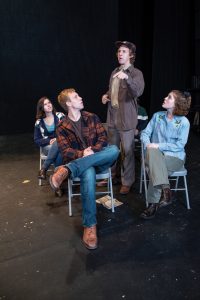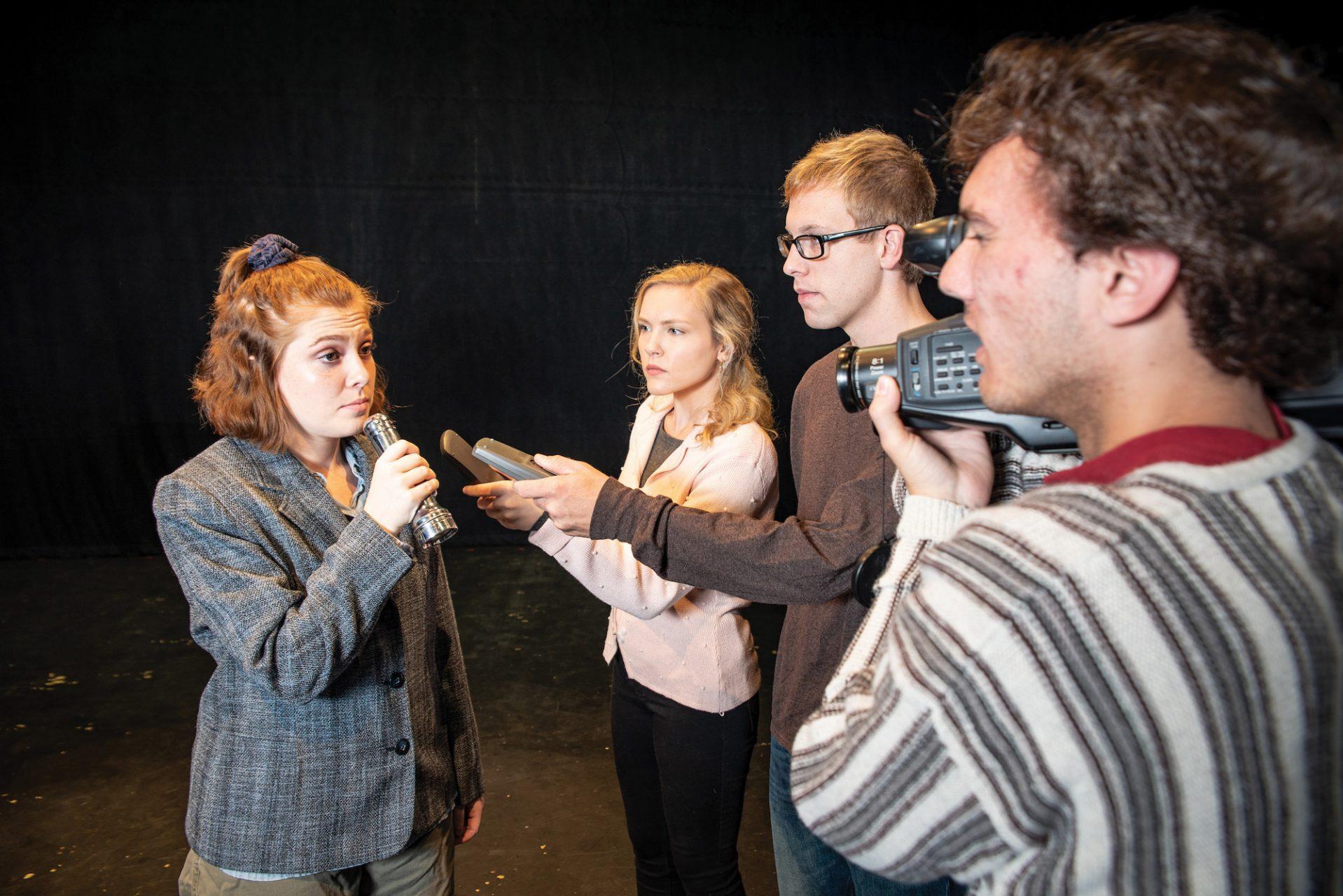Ten students emerged from the costume shop in Chapel Wilson Hall wearing a wide array of jeans, khakis, chunky sweaters and flannel shirts. They spread out on the empty, black stage of the Valborg Theatre.
Suddenly, the stage exploded in sound and movement as the ensemble began moving forward and speaking over one another, portraying the media coverage that descended on the town of Laramie, Wyoming, after the murder of Matthew Shepard. Shepard, a gay student at the University of Wyoming, was attacked and left on a fence to die after approaching two straight men.
“The Laramie Project” is a play constructed entirely from interviews conducted by Moises Kaufman and the Tectonic Theatre Project. In the ensemble show, each actor plays about five people. Every role in the show is based on a real person from Laramie.
“There are over 20 characters in the show, and all of my roles are very similar,” Forrest Baker, an ensemble member and sophomore theatre arts major, said. “It requires a lot of practice and research because you have to make each character distinct so the audience isn’t confused.”
During rehearsal, Teresa Lee, director, sat in the audience as the student actors moved props around the stage and discussed how to present the next moment effectively. “The Laramie Project” is an actor-driven play that uses moments instead of traditional scenes, Lee said. Moment work is an acting process developed by Tectonic Theatre Project.
“I give them time on the stage to explore and see what they can find in the moment, then I come back and shape the dynamic,” Lee said. “Everything starts with what the actors bring to the process, not with set blocking that actors have to work with from the beginning.”
Exploring moments made the experience of “The Laramie Project” different from other plays the cast has performed. Moment work will also make each performance of the play’s seven-day run unique, Mackenzie Smith, an ensemble member and senior theatre arts major, said.
“I don’t think you ever finish exploring in theater because people are different from day-to-day,” Smith said. “I’m not the same person now as when we started rehearsals. I won’t be the same person tomorrow.”

Because moment work is fluid, costumes and props in the show are limited to the simplest possible options. A costume change might only mean adding a cowboy hat or a blazer to a base outfit. A set change might be two actors carrying metal folding chairs with them as they walk across the stage.
“These are moments. They’re not fully realized scenes, they’re not trying to realistically portray the courtroom or the bar where these events are happening,” Lee said. “We’re not asking the audience to suspend their disbelief in that way.”
Although actors have vowed to do their best to tell the story the right way, audience reaction is crucial to the impact of the play, Heather Locklear, an ensemble member and sophomore theatre arts major, said.
“The show allows the audience to have their own views,” Locklear said. “It doesn’t favor any point of view, it just allows anyone who sees it to see the other side of things. We’re all human and we all have a reason to feel the way we do.”
The audience reaction to “The Laramie Project” is significant at App State, where all first-year students were required to read the play as part of this year’s Common Reading Program. Theater professor Keith Martin nominated the book for the program last year when the Department of Theatre and Dance decided to include the play in its 2018-2019 season.
“I think that theater is the appropriate forum for the expression of powerful topics,” Martin said. “In terms of this play, the murder is 20 years old. Think about the first-year class, none of them were alive during the Matthew Shepard hate crime. To them it’s ancient history, so it’s keeping it fresh in the minds of students.”
Through the Common Reading Program, the Department of Theatre and Dance has collaborated with the LGBT center to go black on the night of Oct. 6, the 20th anniversary of Shepard’s death, for a vigil. Members of the cast will also be participating in The Heart Challenge, a project by the Matthew Shepard Foundation where participants decorate hearts and hang them on fences in their communities.
“This is the most unprecedented collaboration I’ve ever seen at App State,” Martin said.
Moises Kaufman, who wrote the play with Tectonic Theatre Group, met with the team of students and faculty members working to put on the play on Sunday over a conference call. Kaufman’s visit to App State to present at the Visiting Writers Series was canceled because of severe weather conditions associated with Hurricane Florence.
“The Laramie Project” will be performed in the Valborg Theatre from Oct. 2-9, excluding Oct. 6. Tickets are $10 for students, $15 for faculty and staff and $17 for the general public.
Story by: Nora Smith, Editor-in-Chief
Photos courtesy Lynn Willis
Featured photo caption: Media representatives from around the world descended upon Laramie, Wyoming in 1986 to cover the Matthew Shepard hate crime and the subsequent trial. Pictured here are Theatre and Dance students involved in the production of “The Laramie Project,” which coincides with the 20th anniversary of the actual event. From left to right, they are Zoe Dean, Virginia Riggsbee, Forrest Barker, and Devon Bucey.

